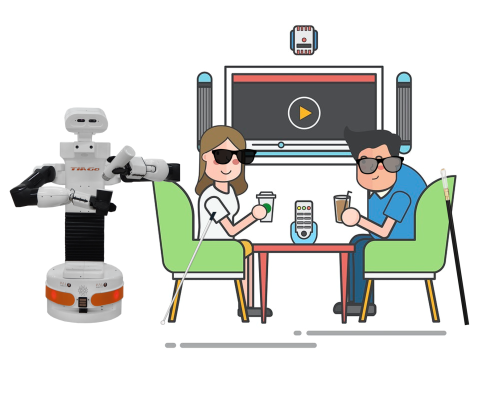The proposal focuses on people with different needs such as elderly, disabled, injured persons with special necessities, individuals in rehabilitation stages, and, in general, people that need some kind of help. The challenge is to cover different ages, different personal situations, and a variety of tasks with similar technologies and procedures in order to create new robotic assistive technologies.
The specific objectives of the proposal cover three main fields: i) physical assistance for peoples that cannot perform one or several daily life activities by themselves in healthcare centers and at home, ii) cognitive assistance that includes mental help, stimulation and social interaction at home and in specialized centers, and iii) rehabilitation that covers medical assessments, collaborative robotic and wearable devices, including exoskeletons, in hospitals and healthcare centers. The proposal will cover both social and physical human-robot interactions that will help to easily and friendly use the robots by persons of any skills.
Technologies that will be used in the proposal will cover the most innovative ones: i) multimodal interaction with the end-users (vocal, visual, gestural, etc.), ii) integrated sensoritization of robots, patients and environments (vision, force, tactile, etc.), iii) medical assessments for intelligent patients monitoring (using the existing medical protocols), iv) automatic force-position path planning generation of the rehabilitation collaborative robots (using DL techniques), v) lightweight robots for wearable exoskeletons (SMA actuators), and vi) serious games (for rehabilitation).
One of the main topics is the integration of these technologies in order to perform integrated therapies. The developed system will exchange the end-users’ data (according to the ethical codes and confidentiality) and will perform, if possible, several therapies (assessment, social care, rehabilitation) in integrated mode. Development of the common Data Base with common benchmarks will be one of the objectives of the proposal. For this issue, several mental and physical models will be proposed.
The consortium will be formed by a R&D robotic center, healthcare centers and medical personnel, a robotics SME company, and experts in legal, ethics and usability of assistive robots. The experimentation environments for the proposal will cover both homes and medical/healthcare sites with real patients, all of them under medical supervision.
Project Reference of the research project funded by MCIN/AEI /10.13039/501100011033 and by the European Union NextGenerationEU/ PRTR

